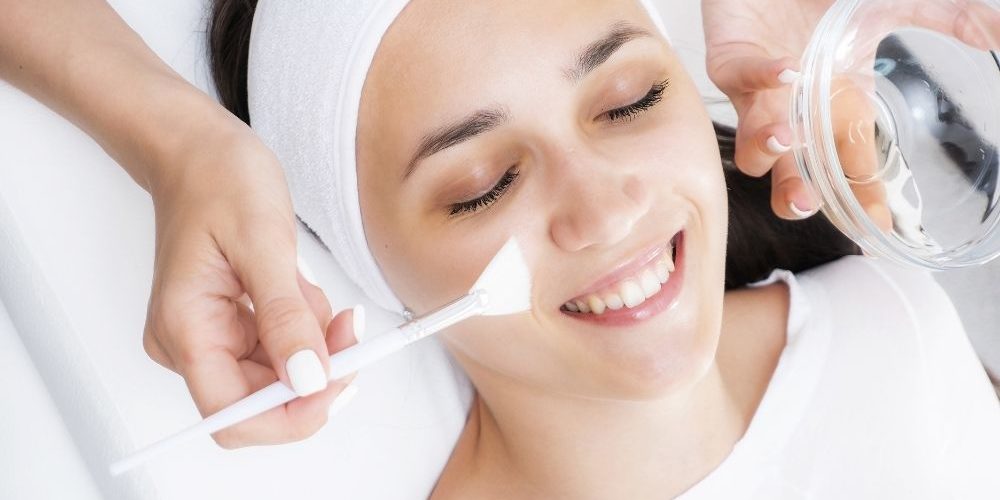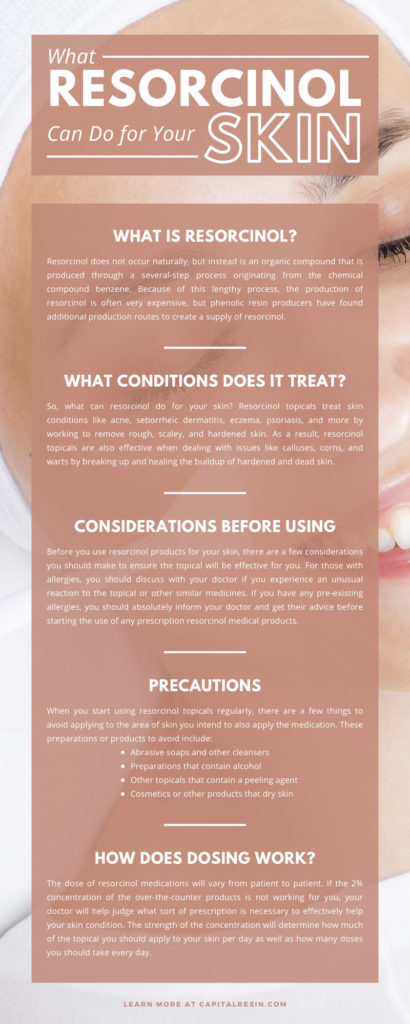Resorcinol is often used in topicals meant to treat a variety of skin conditions. This may come as a surprise to some, as resorcinol is most commonly known in the rubber industry as a key component of tire production for cars. So, how does it end up in topicals? Here’s what resorcinol can do for your skin and how it can be best used.
What Is Resorcinol?
Resorcinol does not occur naturally, but instead is an organic compound that is produced through a several-step process originating from the chemical compound benzene. Because of this lengthy process, the production of resorcinol is often very expensive, but phenolic resin producers have found additional production routes to create a supply of resorcinol. When any large number of resins are melted with the chemical potassium hydroxide or distilled with Brazilwood extract, resorcinol is a part of the final product such a process creates. Like the previously mentioned tires, resorcinol can also be found in products like dye or adhesives when combined with formaldehyde.
What Conditions Does It Treat?
So, what can resorcinol do for your skin? Resorcinol topicals treat skin conditions like acne, seborrheic dermatitis, eczema, psoriasis, and more by working to remove rough, scaley, and hardened skin. As a result, resorcinol topicals are also effective when dealing with issues like calluses, corns, and warts by breaking up and healing the buildup of hardened and dead skin.
When looking for resorcinol skin topicals, they can be found as over-the-counter medications with merely 2% or less resorcinol in concentration with higher concentrates being reserved for prescriptions from doctors. Regardless of prescription or not, it’s key that resorcinol topicals be applied exactly as instructed. Too little of the topical and you’ll not see any of the benefits, but too much of the topical and that high dosage of resorcinol may cause some side effects.
Considerations Before Using
Before you use resorcinol products for your skin, there are a few considerations you should make to ensure the topical will be effective for you.
For those with allergies, you should discuss with your doctor if you experience an unusual reaction to the topical or other similar medicines. If you have any pre-existing allergies, you should absolutely inform your doctor and get their advice before starting the use of any prescription resorcinol medical products. If it’s an over-the-counter topical, however, then you simply need to refer to the label or package ingredients to ensure there isn’t anything you’re allergic to.
For pediatric concerns, as children and young teens are just as vulnerable to skin conditions, it’s important that resorcinol topicals are not applied to a large area of the child’s body. An overabundance of resorcinol could be absorbed through the skin and into the bloodstream, causing harmful side effects like resorcinol poisoning.
For geriatric patients, testing of these topicals on the elderly has been lacking. While there shouldn’t be any different effects from what a young adult would experience, you should consult your doctor once more to see what they recommend for your specific circumstances. Some elderly citizens find themselves with thin skin that could easily allow resorcinol to pass through.
If you are using another medication at the same time you intend to use resorcinol for your skin, you should investigate how the topical may interact with your medication, if at all. Depending on what other medications you’re using, the dosage of the resorcinol may be adjusted to prevent any bad reactions that would harm you more than help you.
Precautions
When you start using resorcinol topicals regularly, there are a few things to avoid applying to the area of skin you intend to also apply the medication. These preparations or products to avoid include:
- Abrasive soaps and other cleansers
- Preparations that contain alcohol
- Other topicals that contain a peeling agent
- Cosmetics or other products that dry skin
It’s not a big deal if you do accidentally mix the topical with other substances on your skin, but it can cause further inflammation of the skin irritants and darken lighter-colored hair. Carefully wash the area off so that you remove the irritants and then you can apply the resorcinol again without issue.
How Does Dosing Work?
The dose of resorcinol medications will vary from patient to patient. If the 2% concentration of the over-the-counter products is not working for you, your doctor will help judge what sort of prescription is necessary to effectively help your skin condition. The strength of the concentration will determine how much of the topical you should apply to your skin per day as well as how many doses you should take every day.
Finding the dosage of a resorcinol lotion is easier to experiment with, as both adults and children can apply it as necessary without any fear of serious side effects such as the aforementioned resorcinol poisoning. Ointments, however, are the products that require a prescription first, and thus your doctor will help you determine the correct dosage.
Are There Side Effects?
So, as we keep mentioning, there is a potential side effect that may occur if you apply too much resorcinol to your skin. Resorcinol poisoning occurs when resorcinol finds its way into your bloodstream and consists of various symptoms such as:
- Diarrhea, nausea, vomiting, stomach pain
- Headaches and dizziness
- Drowsiness
- Restlessness and anxiety
- Shortness of breath and trouble breathing
- Slowed heart rate
- Sweating and sudden feelings of weakness
When you first start using resorcinol topicals, it’s possible you may experience one or more of these symptoms without being afflicted with resorcinol poisoning. This does not require medical attention and will subside once you’ve grown more accustomed to the medication. Check-in with your healthcare provider if the symptoms persist or seem to only intensify. They will either be able to identify and address resorcinol poisoning or provide methods to reduce the symptoms if it’s just a matter of adjusting.
Resorcinol topicals should never seem scary to you, however. When used correctly, resorcinol has been an effective aid for many people suffering from skin irritations and keeps their skin looking healthy. Keep an eye out for over-the-counter resorcinol topicals if you are considering trying out this medication for your own skin condition needs.








